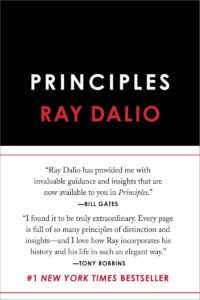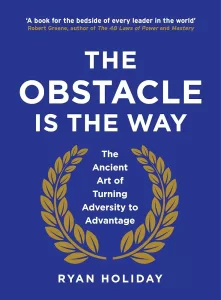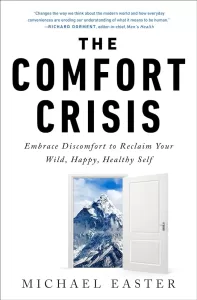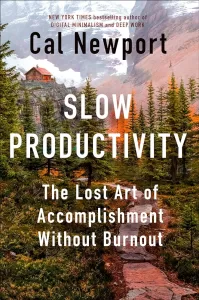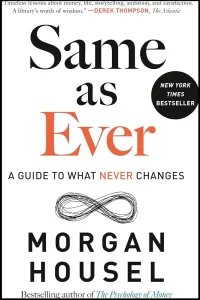Book Review: “Principles: Life and Work”
Book: Principles: Life and Work by Ray Dalio
Reviewer: Bobby Powers
My Thoughts: 8 of 10
Bridgewater founder Ray Dalio is one of the 100 richest men in the world, according to Forbes magazine. In Principles: Life and Work, Dalio shares the principles that have led to his success. Principles is a fascinating look at how Dalio has created the largest and most successful hedge fund in the world. You need only read the first few pages of Principles to discover the uniqueness of Dalio's approach; he encourages readers to doubt everything, suggesting that open-mindedness is the best way to learn. He has built a culture at Bridgewater that tries to allow the best ideas to emerge after relentless debate. Although the book is somewhat repetitive, I greatly enjoyed Dalio's insights into how to become a more successful person, leader, and employee.
Takeaways from the Book
The Power of Principles
- “Without principles we would be forced to react to all the things life throws at us individually, as if we were experiencing each of them for the first time.”
- “All successful people operate by principles that help them be successful, though what they choose to be successful at varies enormously, so their principles vary.”
- “To be principled means to consistently operate with principles that can be clearly explained.”
- “Using principles is a way of both simplifying and improving your decision making. While it might seem obvious to you by now, it’s worth repeating that realizing that almost all ‘cases at hand’ are just ‘another one of those,’ identifying which ‘one of those’ it is, and then applying well-thought-out principles for dealing with it. This will allow you to massively reduce the number of decisions you have to make (I estimate by a factor of something like 100,000) and will lead you to make much better ones. The key to doing this well is to:
- Slow down your thinking so you can note the criteria you are using to make your decision.
- Write the criteria down as a principle.
- Think about those criteria when you have an outcome to assess, and refine them before the next ‘one of those’ comes along.”
Learning Humility
- “The most painful lesson that was repeatedly hammered home is that you can never be sure of anything: There are always risks out there that can hurt you badly, even in the seemingly safest bets, so it’s always best to assume you’re missing something.”
- “Sincerely believe that you might not know the best possible path and recognize that your ability to deal well with ‘not knowing’ is more important than whatever it is you do know.”
- “In retrospect, my crash was one of the best things that ever happened to me because it gave me the humility I needed to balance my aggressiveness. I learned a great fear of being wrong that shifted my mind-set from thinking ‘I’m right’ to asking myself ‘How do I know I’m right?’ And I saw clearly that the best way to answer this question is by finding other independent thinkers who are on the same mission as me and who see things differently from me. By engaging them in thoughtful disagreement, I’d be able to understand their reasoning and have them stress-test mine. That way, we can all raise our probability of being right."
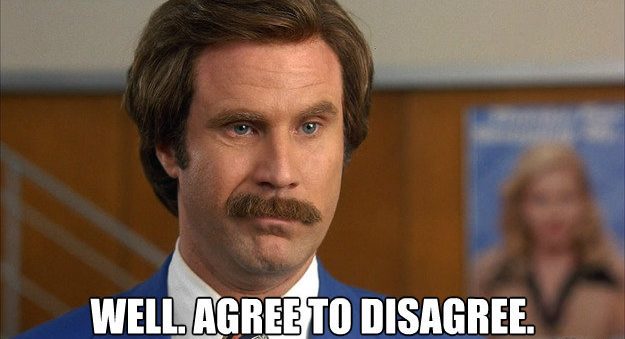
Thoughtful Disagreement
- “As you will see, we are simply a group of people who are striving be excellent at what we do and who recognize that we don’t know much relative to what we need to know. We believe that thoughtful, unemotional disagreement by independent thinkers can be converted in believability-weighted decision making that is smarter and more effective than the sum of its parts.”
- “In other words, I just want to be right—I don’t care if the right answer comes from me. So I learned to be radically open-minded to allow others to point out what I might be missing. I saw that the only way I could succeed would be to:
- Seek out the smartest people who disagreed with me so I could try to understand their reasoning.
- Know when not to have an opinion.
- Develop, test, and systemize timeless and universal principles.
- Balance risks in ways that keep the big upside while reducing the downside.”
- "I urge you to be curious enough to want to understand how the people who see things differently from you came to see them that way."
- “To be effective you must not let your need to be right be more important than your need to find out what’s true.”
- “In thoughtful disagreement, your goal is not to convince the other party that you are right—it is to find out which view is true and decide what to do about it. In thoughtful disagreement, both parties are motivated by the genuine fear of missing important perspectives.”
- “Remind yourself that it’s never harmful to at least hear an opposing point of view.”
- “Being effective at thoughtful disagreement requires one to be open-minded (seeing things through the other’s eyes) and assertive (communicating clearly how things look through your eyes) and to flexibly process this information to create learning and adaptation.”
- “Making suggestions and questioning are not the same as criticizing, so don’t treat them as if they are.”
Truth
- “To me a meaningful relationship is one that’s open and honest in a way that lets people be straight with each other. I never valued more traditional, antiseptic relationships where people put on a facade of politeness and don’t say what they really think...I spoke frankly, and I expected those around me to speak frankly...When I thought someone did something stupid, I said so and I expected them to tell me when I did something stupid. Each of us would be better for it. To me, that was what strong and productive relationships looked like. Operating any other way would be unproductive and unethical.”
- “I learned that the more caring we gave each other, the tougher we could be on each other, and the tougher we were on each other, the better we performed and the more rewards there were for us to share.”
Introspection
- “I have come to realize that bad times coupled with good reflections provide some of the best lessons, and not just about business but also about relationships.”
- “Self-reflection is the quality that most differentiates those who evolve quickly from those who don’t. Remember: Pain + Reflection = Progress.”
- “Create a culture in which it is okay to make mistakes and unacceptable not to learn from them.”
- “It seems to me that if you look back on yourself a year ago and aren’t shocked by how stupid you were, you haven’t learned much.”
- “Reflect and remind yourself that an accurate criticism is the most valuable feedback you can receive.”
Harnessing Pain to Drive Positive Change
- “I came to understand that my encounters were tests of my character and creativity...In gaining this perspective, I began to experience painful moments in a radically different way. Instead of feeling frustrated or overwhelmed, I saw pain as nature’s reminder that there is something important for me to learn. Encountering pains and figuring out the lessons they were trying to give me became sort of a game to me.”
- “In time, I realized that the satisfaction of success doesn’t come from achieving your goals, but from struggling well.”
- “Regularly use pain as your guide toward quality reflection. Mental pain often comes from being too attached to an idea when a person or an event comes along to challenge it. This is especially true when what is being pointed out to you involves a weakness on your part.”

Embrace Reality and Deal with It
- “Truth—or, more precisely, an accurate understanding of reality—is the essential foundation for any good outcome. Most people fight seeing what’s true when it’s not what they want it to be. That’s bad, because it is more important to understand and deal with the bad stuff since the good stuff will take care of itself.”
- “You shouldn’t be upset if you find out that you’re bad at something--you should be happy that you found out, because knowing that and dealing with it will improve your chances of getting what you want. If you are disappointed because you can’t be the best person to do everything yourself, you are terribly naive.”
- Ultimately, embracing reality comes down to five decisions:
- Don’t confuse what you wish were true with what is really true.
- Don’t worry about looking good—worry instead about achieving your goals.
- Don’t overweight first-order consequences relative to second- and third-order ones.
- Don’t let pain stand in the way of progress.
- Don’t blame bad outcomes on anyone but yourself.
Dalio's 5-Step Process
- Have clear goals.
- Identify and don’t tolerate the problems that stand in the way of your achieving those goals.
- Accurately diagnose the problems to get at their root causes.
- Design plans that will get you around them.
- Do what’s necessary to push these designs through to results.
Other Thoughts
- “Maturity is the ability to reject good alternatives in order to pursue even better ones."
- “Remember that great expectations create great capabilities. If you limit your goals to what you know you can achieve, you are setting the bar way too low.”
- Idea Meritocracy = Radical Truth + Radical Transparency + Believability-Weighted Decision Making
- “In the end, accuracy and kindness are the same thing. What might seem kind but isn’t accurate is harmful to the person and often to others in the organization as well.”
- “Avoid the anonymous ‘we’ and ‘they,’ because they mask personal responsibility. Things don’t just happen by themselves--they happen because specific people did or didn’t do specific things. Don’t undermine personal accountability with vagueness...Someone created the procedure that went wrong or made the faulty decision. Glossing over that can only slow progress toward improvement.”
Think you’d like this book?
Other books you may enjoy:
- The Almanack of Naval Ravikant compiled by Eric Jorgenson
- Radical Candor by Kim Scott
Other notable books by the author:
- Principles for Dealing with the Changing World Order
Want to become a stronger leader?
Sign up to get my exclusive
10-page guide for leaders and learners.
